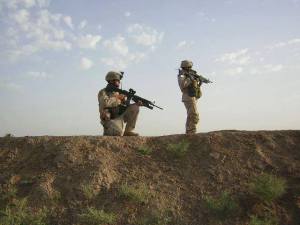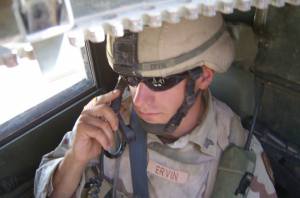When I got into the room and took all my gear off it hit me hard. What exactly it was that hit me I could only describe as an avalanche of horror and hopelessness. I felt like I was trapped in my own death. There was no way out, and I had to play the dice game over and over. It didn’t matter if it happened today, tomorrow, or in the coming months, but it was going to happen, and it was going to be painful, brutal, and ugly. As much as I tried, I couldn’t muster up another thought. It was just all so fucked up, I thought. There was nothing good about this place except for surviving a patrol, and when that happened it just meant that you’d be right back out there the next day. The tears began to well up, but then reason took over. I lit a cigarette.
–excerpt from Leaving the Wire: An Infantryman’s Iraq
 David P. Ervin served as an infantryman in the Iraq War in 2005. But it was a Thanksgiving dinner with his family that made him write about it.
David P. Ervin served as an infantryman in the Iraq War in 2005. But it was a Thanksgiving dinner with his family that made him write about it.
He describes that day as one of those in which “the walls seemed like they were closing in and the anxiety kept ratcheting up.” Continuing, David relates the aftermath of wartime service in a way that many veterans are all-too-familiar with:
My family was gathered together for Thanksgiving and I was there. But, at the same time, I wasn’t. I went outside for a smoke, and my younger brother followed me out. He asked if I was OK. I just told him it was a bad day, head stuff, and that I would be fine. Then he asked me a really simple question, “Where does it all come from?”
 David claims that non-veterans like his younger brother have “no frame of reference” for understanding what is endured during service. Upon returning home, he majored in history because he was drawn to the work of preserving the stories of veterans. But it was the disconnect he saw between those who’ve served and those who’ve not that made him want to write his own history:
David claims that non-veterans like his younger brother have “no frame of reference” for understanding what is endured during service. Upon returning home, he majored in history because he was drawn to the work of preserving the stories of veterans. But it was the disconnect he saw between those who’ve served and those who’ve not that made him want to write his own history:
It dawned on me after he asked his question that I hardly understood what had happened to me. I served as an infantryman from 2002-2006, and did a tour in the Sunni Triangle just south of Baghdad for OIF III. We saw it all there. My company, Echo Troop 2-11 Armored Cavalry Regiment, took five KIA and several more wounded. Most of us who came back are haunted by what happened there. Nothing really made sense, even though I knew I’d experienced what amounted to the essence of the Iraq War; IEDs, mortars and rockets, car bombs, snipers, sectarian violence, and all the rest. I remembered it well, so I figured if I wrote about it maybe I could understand. Maybe I could get to the root of the things troubling me and start dealing with them in a real, tangible way.
David recently completed Leaving the Wire: An Infantryman’s Iraq, an account of his experiences there in Iraq circa 2005.
I wrote about everything. I didn’t pull any punches, and I forced myself to make it emotionally honest and as graphic as the experience itself. I write about being scared out of my wits, callous to the horrors witnessed by others, and the conditioning I put myself through to make it out of there without snapping.
 He understands that he’s entering a market filled with stories of special operations, the invasion, and some of the larger battles of the war, but I he feels that his story of the “average” experience isn’t out there.
He understands that he’s entering a market filled with stories of special operations, the invasion, and some of the larger battles of the war, but I he feels that his story of the “average” experience isn’t out there.
The majority of combat veterans are dealing with an experience that was fairly typical for the war but not so sensational that it would garner a blockbuster movie status. Their story needed to be told, too, though, and I figured if I could tell mine it might help people “get it.” After studying history in college I knew that the only way we had an idea of what the past was like was from the written record of people who experienced things. In a way this was making sure what we did was remembered.
At the moment, David is working with his fellow veterans in one of Military Experience’s online writing groups. This group will lead to the production of Blue Nostalgia, a collection of stories about post-traumatic growth and resiliency produced by The Veterans’ PTSD project. The anticipated release date for that collection is December 2013. You can find Leaving the Wire as an e-book in late October. Follow his continued journey as an author and veteran on Facebook here.



